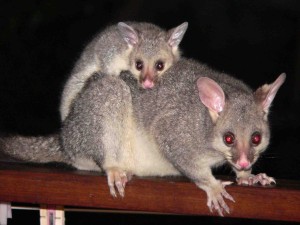I often awake about 3:30 Australian time to the sound of possums raping each other in the trees.
 A new study from the Australian National University concludes that the way bacteria transfer between possums may offer some insight into the spread of human epidemics.
A new study from the Australian National University concludes that the way bacteria transfer between possums may offer some insight into the spread of human epidemics.
Scientists (ANU) looked at how social interactions between mountain brushtail possums influenced the transfer of the bacterium, Escherichia coli.
Surprisingly they found it was not just how much time the possums spent in contact with each other that determined the spread of E. coli, but rather what they were doing when they interacted.
“We originally started out thinking daytime den sharing would be important and that disease transfer might be a reason why individuals in some populations were less likely to share dens,” says lead researcher Dr Michaela Blyton.
“But then we found that it is actually the night time foraging interactions that were more important.”
E. coli is typically thought of as an environmental pathogen that is spread through ingestion of water or food that has been contaminated by faeces. But Blyton says the results, appearing in the journal Ecology Letters, indicate social interactions also play an important role.
“It suggests that the close contact of those individual possums facilitates transfer more than just the environment itself.”
Yes, close interaction.
